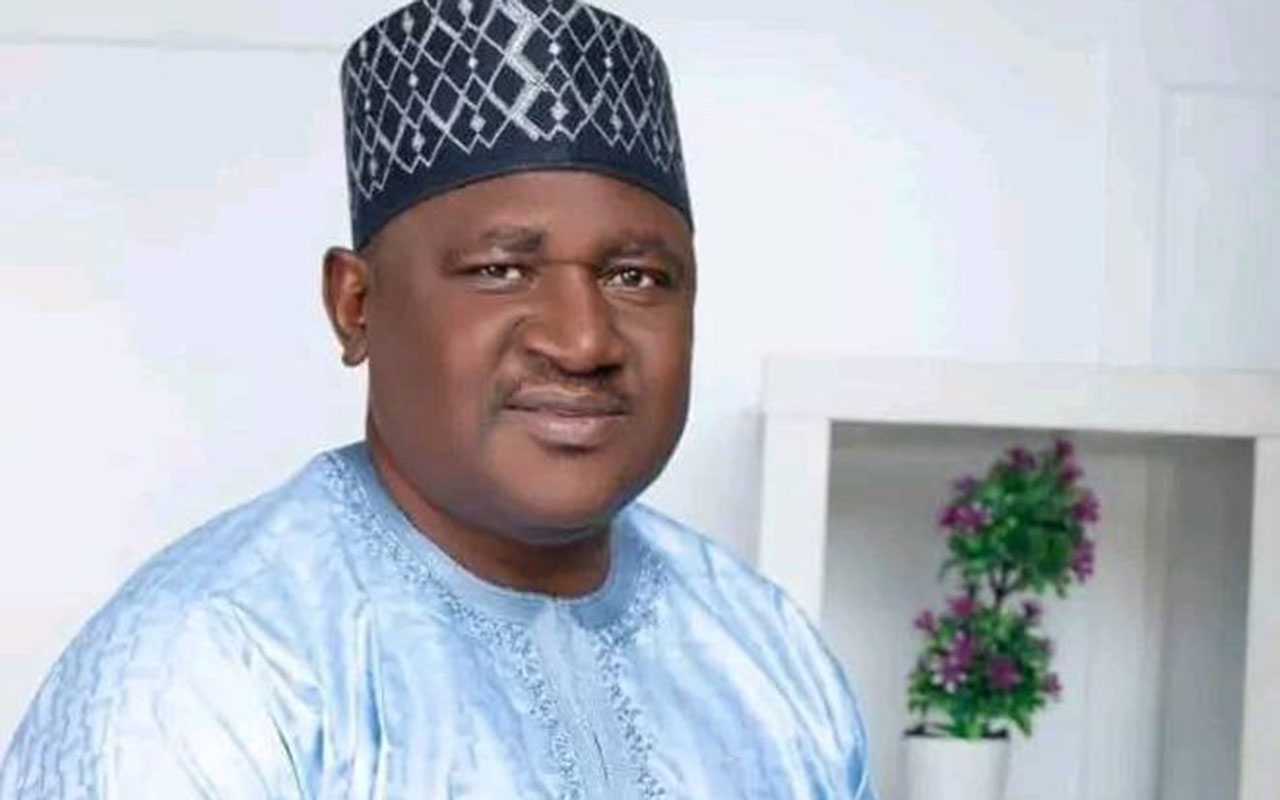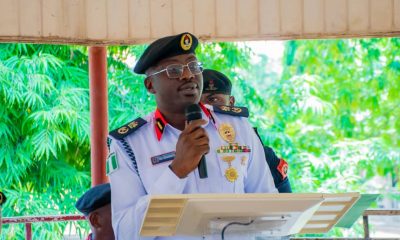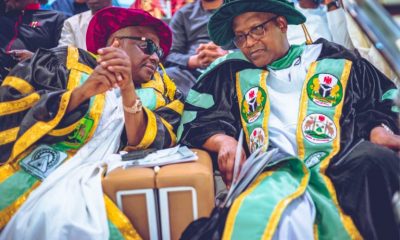News
Five years on: Endless wait for new salary, welfare packages for teachers

Five years on: Endless wait for new salary, welfare packages for teachers
Five years after the Federal Government promised to implement a special salary structure for teachers, the promise has remained a pipe dream. This unfulfilled promise reflects broader challenges affecting teachers’ morale, productivity, and well-being. OWEDE AGBAJILEKE reports that despite their commitment, teachers continue to face difficulties, highlighting the need for urgent attention to address these issues and improve the sector.
Nnneoma Orji has always been passionate about teaching, dedicating her life to shaping young minds and nurturing the next generation of leaders. She has spent about two decades in the classroom, pouring her heart and soul into her work.
However, despite her dedication, she struggles to make ends, following the non-implementation of a professional salary structure for teachers in Nigeria. Her meagre salary barely covers living expenses, leaving her with little to no savings.
Her words echoed the frustrations of many teachers in Nigeria: “Despite my passion for teaching, I’m forced to live from hand to mouth, with no financial stability or security. The lack of a professional salary structure has made it impossible for me to plan for my future or my family’s well-being.”
Orji’s struggle is not unique. Many teachers in Nigeria face similar
challenges, which affect their morale, productivity, and overall well-being.
Their cries seemed to have been heard in 2020 when the federal government announced new teachers’ salaries and reviewed years of service from 35 to 40. It transmitted the bill to the National Assembly, and in 2022, former President Muhammadu Buhari assented to the Harmonised Retirement Age for Teachers in Nigeria Act 2022.
Other promises include building low-cost housing for teachers in rural areas and sponsoring at least one yearly refresher training to benchmark best practices for improved teaching and learning.
The new salary structure is expected to make the least-paid teacher in the public service earn about N150,000 monthly, as against the current salary of about N49,000.
A month after the pronouncement, the national implementation committee on revitalising and repositioning the teaching profession was inaugurated. It was charged to focus on specific areas of intervention as approved by the president and submit its report after three months.
Buhari explained that implementing the new salary scheme encouraged teachers to deliver better services.
To address these challenges and set the country on the path of industrialisation where the educational system will produce the needed skills and manpower, Buhari approved among others, the reintroduction of bursary awards to education students in universities and colleges of education, with the assurance of automatic employment upon graduation; payment of stipends to Bachelor of Education students, as well as, granting them automatic employment after graduation.
According to the new provision, the Tertiary Education Fund (TETFund) will fund teaching practice in the universities and colleges of education, a special salary scale for teachers in basic and secondary schools, including the provisions for rural posting allowance, science teachers allowance, and peculiar allowance.”
A year later, the Nigerian government again pledged to reposition the teaching profession, promising to achieve most targets by January 2022.
However, teachers’ situation has deteriorated, and the government’s failure to fulfil its commitments has left educators in a precarious state.
Analysts noted that the delay in fully implementing the promised reforms has significant implications for the country’s education sector and the well-being of teachers.
Five years after the Federal Government promised to implement a special salary structure for teachers, the promise has remained a pipe dream. This unfulfilled promise reflects broader challenges affecting teachers’ morale, productivity, and well-being. OWEDE AGBAJILEKE reports that despite their commitment, teachers continue to face difficulties, highlighting the need for urgent attention to address these issues and improve the sector.
Nnneoma Orji has always been passionate about teaching, dedicating her life to shaping young minds and nurturing the next generation of leaders. She has spent about two decades in the classroom, pouring her heart and soul into her work.
However, despite her dedication, she struggles to make ends, following the non-implementation of a professional salary structure for teachers in Nigeria. Her meagre salary barely covers living expenses, leaving her with little to no savings.
Her words echoed the frustrations of many teachers in Nigeria: “Despite my passion for teaching, I’m forced to live from hand to mouth, with no financial stability or security. The lack of a professional salary structure has made it impossible for me to plan for my future or my family’s well-being.”
Orji’s struggle is not unique. Many teachers in Nigeria face similar challenges, which affect their morale, productivity, and overall well-being.
Their cries seemed to have been heard in 2020 when the federal government announced new teachers’ salaries and reviewed years of service from 35 to 40. It transmitted the bill to the National Assembly, and in 2022, former President Muhammadu Buhari assented to the Harmonised Retirement Age for Teachers in Nigeria Act 2022.
Other promises include building low-cost housing for teachers in rural areas and sponsoring at least one yearly refresher training to benchmark best practices for improved teaching and learning.
The new salary structure is expected to make the least-paid teacher in the public service earn about N150,000 monthly, as against the current salary of about N49,000.
A month after the pronouncement, the national implementation committee on revitalising and repositioning the teaching profession was inaugurated. It was charged to focus on specific areas of intervention as approved by the president and submit its report after three months.
Buhari explained that implementing the new salary scheme encouraged teachers to deliver better services.
To address these challenges and set the country on the path of industrialisation where the educational system will produce the needed skills and manpower, Buhari approved among others, the reintroduction of bursary awards to education students in universities and colleges of education, with the assurance of automatic employment upon graduation; payment of stipends to Bachelor of Education students, as well as, granting them automatic employment after graduation.
According to the new provision, the Tertiary Education Fund (TETFund) will fund teaching practice in the universities and colleges of education, a special salary scale for teachers in basic and secondary schools, including the provisions for rural posting allowance, science teachers allowance, and peculiar allowance.”
A year later, the Nigerian government again pledged to reposition the teaching profession, promising to achieve most targets by January 2022.
However, teachers’ situation has deteriorated, and the government’s failure to fulfil its commitments has left educators in a precarious state.
Analysts noted that the delay in fully implementing the promised reforms has significant implications for the country’s education sector and the well-being of teachers.
Investigations by The Guardian showed that Nigeria has 2,202,535 teachers in both public and private schools. The breakdown of the data obtained from the Universal Basic Education Commission (UBEC) showed that 354,651 teachers are in Early Childhood Care and Development Education (ECCDE); 915,593 teachers in basic schools, and 419,291 in Junior Secondary Schools (JSS).
Although the National Senior Secondary Education Commission (NSSEC) lacks up-to-date data on the number of teachers in secondary schools, a report by Statista indicated that the country had about 513,000 teachers during the 2018/2019 academic session.
In the educators’ community, the news of the federal government’s approval was received with cheers as it was hoped to be a start in rebuilding Nigeria’s education system, which is in a deplorable state.
Nigeria has also not done well in global rankings, as it ranked 161 in the 2022 United Nations Development Programme’s ranking of countries based on the Human Development Index (HDI).
Besides, Nigeria and other Sub-Saharan African countries face the largest teacher gap: it will need a total of 17 million primary and secondary school teachers by 2030.
Five years after the Federal Government promised to implement a special salary structure for teachers, the promise has remained a pipe dream. This unfulfilled promise reflects broader challenges affecting teachers’ morale, productivity, and well-being. OWEDE AGBAJILEKE reports that despite their commitment, teachers continue to face difficulties, highlighting the need for urgent attention to address these issues and improve the sector.
Nnneoma Orji has always been passionate about teaching, dedicating her life to shaping young minds and nurturing the next generation of leaders. She has spent about two decades in the classroom, pouring her heart and soul into her work.
However, despite her dedication, she struggles to make ends, following the non-implementation of a professional salary structure for teachers in Nigeria. Her meagre salary barely covers living expenses, leaving her with little to no savings.
Her words echoed the frustrations of many teachers in Nigeria: “Despite my passion for teaching, I’m forced to live from hand to mouth, with no financial stability or security. The lack of a professional salary structure has made it impossible for me to plan for my future or my family’s well-being.”
Orji’s struggle is not unique. Many teachers in Nigeria face similar challenges, which affect their morale, productivity, and overall well-being.
Their cries seemed to have been heard in 2020 when the federal government announced new teachers’ salaries and reviewed years of service from 35 to 40. It transmitted the bill to the National Assembly, and in 2022, former President Muhammadu Buhari assented to the Harmonised Retirement Age for Teachers in Nigeria Act 2022.
Other promises include building low-cost housing for teachers in rural areas and sponsoring at least one yearly refresher training to benchmark best practices for improved teaching and learning.
The new salary structure is expected to make the least-paid teacher in the public service earn about N150,000 monthly, as against the current salary of about N49,000.
A month after the pronouncement, the national implementation committee on revitalising and repositioning the teaching profession was inaugurated. It was charged to focus on specific areas of intervention as approved by the president and submit its report after three months.
Buhari explained that implementing the new salary scheme encouraged teachers to deliver better services.
To address these challenges and set the country on the path of industrialisation where the educational system will produce the needed skills and manpower, Buhari approved among others, the reintroduction of bursary awards to education students in universities and colleges of education, with the assurance of automatic employment upon graduation; payment of stipends to Bachelor of Education students, as well as, granting them automatic employment after graduation.
According to the new provision, the Tertiary Education Fund (TETFund) will fund teaching practice in the universities and colleges of education, a special salary scale for teachers in basic and secondary schools, including the provisions for rural posting allowance, science teachers allowance, and peculiar allowance.”
A year later, the Nigerian government again pledged to reposition the teaching profession, promising to achieve most targets by January 2022.
However, teachers’ situation has deteriorated, and the government’s failure to fulfil its commitments has left educators in a precarious state.
Analysts noted that the delay in fully implementing the promised reforms has significant implications for the country’s education sector and the well-being of teachers.
Investigations by The Guardian showed that Nigeria has 2,202,535 teachers in both public and private schools. The breakdown of the data obtained from the Universal Basic Education Commission (UBEC) showed that 354,651 teachers are in Early Childhood Care and Development Education (ECCDE); 915,593 teachers in basic schools, and 419,291 in Junior Secondary Schools (JSS).
Although the National Senior Secondary Education Commission (NSSEC) lacks up-to-date data on the number of teachers in secondary schools, a report by Statista indicated that the country had about 513,000 teachers during the 2018/2019 academic session.
In the educators’ community, the news of the federal government’s approval was received with cheers as it was hoped to be a start in rebuilding Nigeria’s education system, which is in a deplorable state.
Nigeria has also not done well in global rankings, as it ranked 161 in the 2022 United Nations Development Programme’s ranking of countries based on the Human Development Index (HDI).
Besides, Nigeria and other Sub-Saharan African countries face the largest teacher gap: it will need a total of 17 million primary and secondary school teachers by 2030.
It is also the region with the fastest-growing school-age population. It is already struggling to keep up with demand: more than 70 per cent of the region’s countries face acute shortages of primary school teachers, rising to 90 per cent for secondary education.
In the next six years, countries must recruit almost 69 million teachers to provide every child with primary and secondary education. That is, 24.4 million primary school teachers and 44.4 million secondary school teachers.
Sustainable Development Goal 4 (SDG 4) demands inclusive and equitable quality education for all by 2030. The needs are urgent; an estimated 263 million children and youth are still out of primary and secondary school.
SDG 4 includes a specific call for more qualified teachers and more support from the international community for teacher training in developing countries.
Nigerian teachers – especially those in primary and secondary schools – are poorly remunerated and work under some of the worst conditions imaginable
Little wonder government-owned and many private schools are losing their best teachers to other sectors. The teachers feel unmotivated and least appreciated.
Meanwhile, teachers are concerned about their difficulties, including low pay, inadequate facilities, insufficient qualified educators, and poor working conditions.
They lamented that these challenges affect their well-being and ability to provide quality education.
In an interview with The Guardian, Tonia Alabi, a teacher, expressed frustration at the government’s inability to fulfil its promise of professional salaries for teachers, five years later.
She said this development has further exacerbated teachers’ challenges, leading to a decline in their morale and motivation.
Five years on: Endless wait for new salary, welfare packages for teachers
By : OWEDE AGBAJILEKE
Date: 28 Apr 2025
Share :
NUT-President-Titus-Amba-e1695751043584
Audu Amba
Five years after the Federal Government promised to implement a special salary structure for teachers, the promise has remained a pipe dream. This unfulfilled promise reflects broader challenges affecting teachers’ morale, productivity, and well-being. OWEDE AGBAJILEKE reports that despite their commitment, teachers continue to face difficulties, highlighting the need for urgent attention to address these issues and improve the sector.
Nnneoma Orji has always been passionate about teaching, dedicating her life to shaping young minds and nurturing the next generation of leaders. She has spent about two decades in the classroom, pouring her heart and soul into her work.
However, despite her dedication, she struggles to make ends, following the non-implementation of a professional salary structure for teachers in Nigeria. Her meagre salary barely covers living expenses, leaving her with little to no savings.
Her words echoed the frustrations of many teachers in Nigeria: “Despite my passion for teaching, I’m forced to live from hand to mouth, with no financial stability or security. The lack of a professional salary structure has made it impossible for me to plan for my future or my family’s well-being.”
Orji’s struggle is not unique. Many teachers in Nigeria face similar challenges, which affect their morale, productivity, and overall well-being.
Their cries seemed to have been heard in 2020 when the federal government announced new teachers’ salaries and reviewed years of service from 35 to 40. It transmitted the bill to the National Assembly, and in 2022, former President Muhammadu Buhari assented to the Harmonised Retirement Age for Teachers in Nigeria Act 2022.
Other promises include building low-cost housing for teachers in rural areas and sponsoring at least one yearly refresher training to benchmark best practices for improved teaching and learning.
The new salary structure is expected to make the least-paid teacher in the public service earn about N150,000 monthly, as against the current salary of about N49,000.
A month after the pronouncement, the national implementation committee on revitalising and repositioning the teaching profession was inaugurated. It was charged to focus on specific areas of intervention as approved by the president and submit its report after three months.
Buhari explained that implementing the new salary scheme encouraged teachers to deliver better services.
To address these challenges and set the country on the path of industrialisation where the educational system will produce the needed skills and manpower, Buhari approved among others, the reintroduction of bursary awards to education students in universities and colleges of education, with the assurance of automatic employment upon graduation; payment of stipends to Bachelor of Education students, as well as, granting them automatic employment after graduation.
According to the new provision, the Tertiary Education Fund (TETFund) will fund teaching practice in the universities and colleges of education, a special salary scale for teachers in basic and secondary schools, including the provisions for rural posting allowance, science teachers allowance, and peculiar allowance.”
A year later, the Nigerian government again pledged to reposition the teaching profession, promising to achieve most targets by January 2022.
However, teachers’ situation has deteriorated, and the government’s failure to fulfil its commitments has left educators in a precarious state.
Analysts noted that the delay in fully implementing the promised reforms has significant implications for the country’s education sector and the well-being of teachers.
Investigations by The Guardian showed that Nigeria has 2,202,535 teachers in both public and private schools. The breakdown of the data obtained from the Universal Basic Education Commission (UBEC) showed that 354,651 teachers are in Early Childhood Care and Development Education (ECCDE); 915,593 teachers in basic schools, and 419,291 in Junior Secondary Schools (JSS).
Although the National Senior Secondary Education Commission (NSSEC) lacks up-to-date data on the number of teachers in secondary schools, a report by Statista indicated that the country had about 513,000 teachers during the 2018/2019 academic session.
In the educators’ community, the news of the federal government’s approval was received with cheers as it was hoped to be a start in rebuilding Nigeria’s education system, which is in a deplorable state.
Nigeria has also not done well in global rankings, as it ranked 161 in the 2022 United Nations Development Programme’s ranking of countries based on the Human Development Index (HDI).
Besides, Nigeria and other Sub-Saharan African countries face the largest teacher gap: it will need a total of 17 million primary and secondary school teachers by 2030.
It is also the region with the fastest-growing school-age population. It is already struggling to keep up with demand: more than 70 per cent of the region’s countries face acute shortages of primary school teachers, rising to 90 per cent for secondary education.
In the next six years, countries must recruit almost 69 million teachers to provide every child with primary and secondary education. That is, 24.4 million primary school teachers and 44.4 million secondary school teachers.
Sustainable Development Goal 4 (SDG 4) demands inclusive and equitable quality education for all by 2030. The needs are urgent; an estimated 263 million children and youth are still out of primary and secondary school.
SDG 4 includes a specific call for more qualified teachers and more support from the international community for teacher training in developing countries.
Nigerian teachers – especially those in primary and secondary schools – are poorly remunerated and work under some of the worst conditions imaginable.
Little wonder government-owned and many private schools are losing their best teachers to other sectors. The teachers feel unmotivated and least appreciated.
Meanwhile, teachers are concerned about their difficulties, including low pay, inadequate facilities, insufficient qualified educators, and poor working conditions.
They lamented that these challenges affect their well-being and ability to provide quality education.
In an interview with The Guardian, Tonia Alabi, a teacher, expressed frustration at the government’s inability to fulfil its promise of professional salaries for teachers, five years later.
Related News
TETFund’s R4i Initiative sparks reactions from stakeholders
Kwara govt, TETFund collaborate on infrastructure, empowerment
2027 poll: Ex-CPC NASS members tackle Malami, back support for Tinubu
She said this development has further exacerbated teachers’ challenges, leading to a decline in their morale and motivation.
Alabi emphasised that the government’s failure to implement the promised professional salaries has resulted in a brain drain in the education sector, with many qualified teachers seeking better-paying opportunities in other fields.
She said: “We are not just disappointed, we are demoralised. The government’s failure to fulfil its promise of a new salary structure made us feel like our profession was not valued. Many of my colleagues have left the profession or are planning to, and it’s hard to blame them. We need better working conditions, better pay, and more support to provide quality education for our students.”
Another teacher, Hassan Taiwo, emphasised that the lack of support and resources, poor working conditions, and low pay have created an unsustainable environment for educators.
He said many qualified teachers seek better opportunities elsewhere, leading to a significant brain drain in the sector.
Taiwo said: “We are not just leaving the profession, we are being pushed out. The lack of support, poor working conditions, and low pay make it impossible for us to continue. The government needs to take immediate action to address these issues and provide a sustainable environment for educators to thrive
Speaking on the development, the National President of the Nigerian Union of Teachers (NUT), Audu Amba, expressed disappointment that out of numerous promises made to the union over the past five years, only one has been fulfilled – the extension of years of service.
He was, however, optimistic that the current administration would prioritise the implementation of welfare packages for teachers, stressing that they are essential for boosting their morale, job satisfaction, and overall performance.
Amba lamented that of the 36 states, only 21 have approved teacher elongation.
“Regarding the welfare packages for teachers, none have been implemented. However, I know that the federal government has started implementing the stipends for students who are taking education courses. We have not relented in persuading the government to keep its promise. We all know that government is a continuous process.”
The NUT president warned that the challenge of attracting and retaining young, dedicated persons into the teaching profession would remain unabated if educators’ living and working conditions are not given due attention and addressed in the interest of teachers’ effectiveness and greater service delivery
domesticated, which can be in the states, while the FG would come up with a prototype for them to copy.
“An inter-ministerial committee was set up by the Federal Ministry of Education, comprising the Federal Ministry of Finance, Ministry of Justice and National Incomes, Salaries and Wages Commission, while directors from various states were brought in to determine what each state would pay, and the wages commission was mandated to work on the package.
But as we speak, that was the last we heard of the matter until the Buhari administration left office,” Ene said.
He said another key issue the government should implement was the promise to raise the bar of employment for teachers, such that if university graduates are placed on grade level eight, those who studied education would be placed on grade level nine, to serve as an incentive.
He said it was unfortunate that after several years, the policy was not implemented either at the federal or state level, despite efforts made by the leadership of NUT to ensure its enforcement.
“What we are saying, therefore, is that governments at all levels, whether at the local, state, or federal level should not play politics with education,” Ene said.
Stakeholders also expressed worry that the development raises concerns about the government’s commitment to addressing issues bordering on teachers’ welfare and educational development.
According to them, the government’s actions seem inconsistent with its promises, leading to concerns about its commitment to improving teachers’ welfare and advancing educational development.
They emphasised that teachers’ welfare and educational development are crucial to the nation’s progress, and Tinubu’s administration must prioritise these areas to ensure quality education and a brighter future for Nigerian students.
A public affairs analyst, Emmanuel Omole, noted that studies have shown that welfare practices significantly affect teacher performance and productivity.
Citing a study on the impact of teacher welfare on quality education, Omole noted that emphasis on staff welfare motivates teachers, enhancing their efficiency and effectiveness.
An official of the Federal Ministry of Education, who pleaded anonymity, said that the government was implementing the promises systematically.
Five years after the Federal Government promised to implement a special salary structure for teachers, the promise has remained a pipe dream. This unfulfilled promise reflects broader challenges affecting teachers’ morale, productivity, and well-being. OWEDE AGBAJILEKE reports that despite their commitment, teachers continue to face difficulties, highlighting the need for urgent attention to address these issues and improve the sector.
Nnneoma Orji has always been passionate about teaching, dedicating her life to shaping young minds and nurturing the next generation of leaders. She has spent about two decades in the classroom, pouring her heart and soul into her work.
However, despite her dedication, she struggles to make ends, following the non-implementation of a professional salary structure for teachers in Nigeria. Her meagre salary barely covers living expenses, leaving her with little to no savings.
Her words echoed the frustrations of many teachers in Nigeria: “Despite my passion for teaching, I’m forced to live from hand to mouth, with no financial stability or security. The lack of a professional salary structure has made it impossible for me to plan for my future or my family’s well-being.”
Orji’s struggle is not unique. Many teachers in Nigeria face similar challenges, which affect their morale, productivity, and overall well-being.
Their cries seemed to have been heard in 2020 when the federal government announced new teachers’ salaries and reviewed years of service from 35 to 40. It transmitted the bill to the National Assembly, and in 2022, former President Muhammadu Buhari assented to the Harmonised Retirement Age for Teachers in Nigeria Act 2022.
Other promises include building low-cost housing for teachers in rural areas and sponsoring at least one yearly refresher training to benchmark best practices for improved teaching and learning.
The new salary structure is expected to make the least-paid teacher in the public service earn about N150,000 monthly, as against the current salary of about N49,000.
A month after the pronouncement, the national implementation committee on revitalising and repositioning the teaching profession was inaugurated. It was charged to focus on specific areas of intervention as approved by the president and submit its report after three months.
Buhari explained that implementing the new salary scheme encouraged teachers to deliver better services.
To address these challenges and set the country on the path of industrialisation where the educational system will produce the needed skills and manpower, Buhari approved among others, the reintroduction of bursary awards to education students in universities and colleges of education, with the assurance of automatic employment upon graduation; payment of stipends to Bachelor of Education students, as well as, granting them automatic employment after graduation.
According to the new provision, the Tertiary Education Fund (TETFund) will fund teaching practice in the universities and colleges of education, a special salary scale for teachers in basic and secondary schools, including the provisions for rural posting allowance, science teachers allowance, and peculiar allowance.”
A year later, the Nigerian government again pledged to reposition the teaching profession, promising to achieve most targets by January 2022.
However, teachers’ situation has deteriorated, and the government’s failure to fulfil its commitments has left educators in a precarious state.
Analysts noted that the delay in fully implementing the promised reforms has significant implications for the country’s education sector and the well-being of teachers.
Investigations by The Guardian showed that Nigeria has 2,202,535 teachers in both public and private schools. The breakdown of the data obtained from the Universal Basic Education Commission (UBEC) showed that 354,651 teachers are in Early Childhood Care and Development Education (ECCDE); 915,593 teachers in basic schools, and 419,291 in Junior Secondary Schools (JSS).
Although the National Senior Secondary Education Commission (NSSEC) lacks up-to-date data on the number of teachers in secondary schools, a report by Statista indicated that the country had about 513,000 teachers during the 2018/2019 academic session.
In the educators’ community, the news of the federal government’s approval was received with cheers as it was hoped to be a start in rebuilding Nigeria’s education system, which is in a deplorable state.
Nigeria has also not done well in global rankings, as it ranked 161 in the 2022 United Nations Development Programme’s ranking of countries based on the Human Development Index (HDI).
Besides, Nigeria and other Sub-Saharan African countries face the largest teacher gap: it will need a total of 17 million primary and secondary school teachers by 2030.
It is also the region with the fastest-growing school-age population. It is already struggling to keep up with demand: more than 70 per cent of the region’s countries face acute shortages of primary school teachers, rising to 90 per cent for secondary education.
In the next six years, countries must recruit almost 69 million teachers to provide every child with primary and secondary education. That is, 24.4 million primary school teachers and 44.4 million secondary school teachers.
Sustainable Development Goal 4 (SDG 4) demands inclusive and equitable quality education for all by 2030. The needs are urgent; an estimated 263 million children and youth are still out of primary and secondary school.
SDG 4 includes a specific call for more qualified teachers and more support from the international community for teacher training in developing countries.
Nigerian teachers – especially those in primary and secondary schools – are poorly remunerated and work under some of the worst conditions imaginable.
Little wonder government-owned and many private schools are losing their best teachers to other sectors. The teachers feel unmotivated and least appreciated.
Meanwhile, teachers are concerned about their difficulties, including low pay, inadequate facilities, insufficient qualified educators, and poor working conditions.
They lamented that these challenges affect their well-being and ability to provide quality education.
In an interview with The Guardian, Tonia Alabi, a teacher, expressed frustration at the government’s inability to fulfil its promise of professional salaries for teachers, five years later.
development has further exacerbated teachers’ challenges, leading to a decline in their morale and motivation.
Alabi emphasised that the government’s failure to implement the promised professional salaries has resulted in a brain drain in the education sector, with many qualified teachers seeking better-paying opportunities in other fields.
She said: “We are not just disappointed, we are demoralised. The government’s failure to fulfil its promise of a new salary structure made us feel like our profession was not valued. Many of my colleagues have left the profession or are planning to, and it’s hard to blame them. We need better working conditions, better pay, and more support to provide quality education for our students.”
Another teacher, Hassan Taiwo, emphasised that the lack of support and resources, poor working conditions, and low pay have created an unsustainable environment for educators.
He said many qualified teachers seek better opportunities elsewhere, leading to a significant brain drain in the sector.
Taiwo said: “We are not just leaving the profession, we are being pushed out. The lack of support, poor working conditions, and low pay make it impossible for us to continue. The government needs to take immediate action to address these issues and provide a sustainable environment for educators to thrive.”
Speaking on the development, the National President of the Nigerian Union of Teachers (NUT), Audu Amba, expressed disappointment that out of numerous promises made to the union over the past five years, only one has been fulfilled – the extension of years of service.
He was, however, optimistic that the current administration would prioritise the implementation of welfare packages for teachers, stressing that they are essential for boosting their morale, job satisfaction, and overall performance.
Amba lamented that of the 36 states, only 21 have approved teacher elongation.
“Regarding the welfare packages for teachers, none have been implemented. However, I know that the federal government has started implementing the stipends for students who are taking education courses. We have not relented in persuading the government to keep its promise. We all know that government is a continuous process.”
The NUT president warned that the challenge of attracting and retaining young, dedicated persons into the teaching profession would remain unabated if educators’ living and working conditions are not given due attention and addressed in the interest of teachers’ effectiveness and greater service delivery.
He noted that teachers not only work under deplorable conditions, but they often suffer public disdain, disregard, and are denied their due status and rightful place in society.
This, Amba noted, negatively affects the needed attraction and retention of new professionals in the teaching service.
The immediate past NUT Secretary, Dr Mike Ene, while appealing to President Tinubu to ensure that the outlined welfare packages are implemented, said that some of the issues only require policy direction, and as such, should not be delayed.
For instance, under the housing scheme for teachers, Ene said the federal government could come up with a policy pronouncement on where it would be domesticated, which can be in the states, while the FG would come up with a prototype for them to copy.
“An inter-ministerial committee was set up by the Federal Ministry of Education, comprising the Federal Ministry of Finance, Ministry of Justice and National Incomes, Salaries and Wages Commission, while directors from various states were brought in to determine what each state would pay, and the wages commission was mandated to work on the package.
But as we speak, that was the last we heard of the matter until the Buhari administration left office,” Ene said.
He said another key issue the government should implement was the promise to raise the bar of employment for teachers, such that if university graduates are placed on grade level eight, those who studied education would be placed on grade level nine, to serve as an incentive.
He said it was unfortunate that after several years, the policy was not implemented either at the federal or state level, despite efforts made by the leadership of NUT to ensure its enforcement.
“What we are saying, therefore, is that governments at all levels, whether at the local, state, or federal level should not play politics with education,” Ene said.
Stakeholders also expressed worry that the development raises concerns about the government’s commitment to addressing issues bordering on teachers’ welfare and educational development.
According to them, the government’s actions seem inconsistent with its promises, leading to concerns about its commitment to improving teachers’ welfare and advancing educational development.
They emphasised that teachers’ welfare and educational development are crucial to the nation’s progress, and Tinubu’s administration must prioritise these areas to ensure quality education and a brighter future for Nigerian students.
A public affairs analyst, Emmanuel Omole, noted that studies have shown that welfare practices significantly affect teacher performance and productivity.
Citing a study on the impact of teacher welfare on quality education, Omole noted that emphasis on staff welfare motivates teachers, enhancing their efficiency and effectiveness.
An official of the Federal Ministry of Education, who pleaded anonymity, said that the government was implementing the promises systematically.
He said when the federal government approved the revitalisation policy for teachers, there were about 11 items, out of which six have been addressed.
“One, you are all aware of the elongation of years of service; there was also a scholarship for every student studying education in our universities, which is being implemented partially. We have written to the presidency, so scholarship is partially ongoing; others will be addressed in due course,” the official added.
News
Fidelity Bank Improves Access to Quality Education in Anambra

Fidelity Bank Improves Access to Quality Education in Anambra
Leading financial institution, Fidelity Bank Plc has reaffirmed its commitment to advancing quality education and youth empowerment with the renovation of an administrative building to Community Secondary School, Enugwuabo Ufuma, in Orumba North Local Government Area of Anambra State.
The one-storey administrative block was comprehensively renovated as part of Fidelity Bank’s interventions to address infrastructural challenges faced by the school. The renovated facility was then formally handed over to the school community at a ceremony attended by government officials, community leaders, and other stakeholders.
Speaking at the official handover ceremony, the Regional Bank Head, Fidelity Bank Plc Awka, Dr. Nosa Orumwense, said the project underscores the bank’s long-standing commitment to investing in education as a catalyst for sustainable development.
“For us at Fidelity Bank, this project represents more than a building. It represents opportunity, progress, and a shared commitment to building a better future for our youths here in Enugwuabo Ufuma and beyond.
By improving the educational infrastructure of this community, we are providing students and teachers with an environment that promotes learning, discipline, and pride”, Orumwense added.
Also speaking at the event, the Commissioner for Education, Professor Ngozi Chuma-Udeh, who represented the Governor of Anambra State, Professor Chukwuma Soludo, described the project as a true demonstration of corporate social responsibility.
“Corporate social responsibility is what gives an organisation its human nature. What Fidelity Bank has done reflects compassion and a genuine commitment to touching lives”, Prof. Chuma-Udeh said.
This school was earlier placed on an emergency list due to the deplorable condition of its buildings. During my last visit, I was genuinely concerned about the safety of both students and teachers. Today, the school wears a new look, thanks to Fidelity Bank’s support”.
The Commissioner also expressed the state government’s appreciation to Fidelity Bank, saying, “We thank Fidelity Bank for this intervention, which clearly demonstrates the true meaning of corporate social responsibility – making tangible impacts that improve lives and strengthen communities”.
The project forms part of Fidelity Bank’s broader CSR strategy focused on empowering communities, strengthening educational institutions, and creating long-term socio-economic value across Nigeria.
Ranked among the best banks in Nigeria, Fidelity Bank Plc is a full-fledged Commercial Deposit Money Bank serving over 9.1 million customers through digital banking channels, its 255 business offices in Nigeria and United Kingdom subsidiary, FidBank UK Limited.
The Bank is a recipient of multiple local and international Awards, including the 2024 Excellence in Digital Transformation & MSME Banking Award by BusinessDay Banks and Financial Institutions (BAFI) Awards; the 2024 Most Innovative Mobile Banking Application award for its Fidelity Mobile App by Global Business Outlook, and the 2024 Most Innovative Investment Banking Service Provider award by Global Brands Magazine. Additionally, the Bank was recognized as the Best Bank for SMEs in Nigeria by the Euromoney Awards for Excellence and as the Export Financing Bank of the Year by the BusinessDay Banks and Financial Institutions (BAFI) Awards.
News
Nafisa, World’s Best in English, Launches Campaign to Stop Vernacular Speaking and Promote English in Northern Schools

Nafisa, World’s Best in English, Launches Campaign to Stop Vernacular Speaking and Promote English in Northern Schools
Nafisa Abdullahi Aminu, celebrated winner of the prestigious TeenEagle3 English Language Global Finals, has unveiled a bold new campaign to promote the exclusive use of English in Northern Nigerian schools, advocating for the gradual phasing out of vernacular in classrooms.
Speaking on behalf of her peers at Nigerian Tulip International College (NTIC) during a recognition visit by the Arewa Consultative Forum (ACF) and Zenith Bank, Nafisa expressed deep appreciation for the honour accorded to the students.
According to Nafisa, “English Language is more than just a subject; it is a gateway. For students, fluency in English opens doors to higher education, global resources, and academic breakthroughs. On the other hand, a weak command of English can become a barrier, closing opportunities and limiting the ability to compete on equal ground in examinations, research, and international engagements.”
She unveiled her campaign, tagged “Always Speak English: No More Vernacular in Schools,” under her new initiative, English Language for Peace and Development. The project aims to strengthen literacy, improve educational outcomes, foster peacebuilding, and expand economic opportunities for Northern students through mastery of English.
The Global Champion described the ACF’s engagement as a strong demonstration of its commitment to youth development, educational advancement, and the future of Northern Nigeria.
Nafisa further called on Northern leaders to build stronger partnerships with institutions like Nigerian Tulip International College, which, she noted, combines academic excellence with character development.
The Arewa Consultative Forum expressed readiness to support Nafisa’s campaign, recognising its alignment with the Forum’s broader vision of advancing education and promoting peace across the region.
Nafisa concluded with a prayer for the leaders, reaffirming her generation’s commitment to using education as a tool to reshape the region’s future.
Signed
Hassan Salihu
Media Advisor to
Nafisa Abdullahi Aminu
27th September, 2025
News
Nigerian National School Awards 2025 (NNSA) Now Holds On Saturday November 29th 2025

Nigerian National School Awards 2025 (NNSA) Now Holds On Saturday November 29th 2025
All is set for the Nigerian National School Awards 2025 (NNSA)
The highly anticipated event initially slated for the 22nd of October 2025 would now hold on the 29th of November 2025 at the same venue, the Lagos Chambers of Commerce and Industry (LCCI), Conference and Exhibition Centre, 10 Nurudeen Olowopopo Street, Behind Maruwa Garden, Alausa, Ikeja, Lagos. Time : 10am.
According to the convener of the Nigerian National School Awards 2025, Mr. Okpe Anthony Okpe, CEO of Tony Okpe Communications apologize for any inconveniences this change of date must have caused and assured all recipients and anticipated sponsors that the event would now take place on the 29th of November 2025 as announced
Mr. Okpe Anthony Okpe who further said we are celebrating and honoring and presenting over 50 awards making it the largest gathering of schools, students, teachers, parents, service providers, individuals and corporate organisation in Nigeria
Meet 100+ exhibitors showcasing the latest in educational materials and technology
Connect with top schools and service providers in one roof
Schools/ Service Providers: – Providing Elementary and Secondary Education, Alternative/Special Education Services, Education Management Organizations, Charter Schools, Virtual Schools, and Proprietary Schools.
Supplemental Education Service Providers: Providing Higher Education, Vocational Education, Learning Centers, Tutoring Services and Assessment Services.
Educational Products & Services Sector: Production and supply of educational material and products including Educational Products, Publishing, and Supplemental Products.
Education Support Services Sector: – Providing support and ancillary services to the education industry including Education Consultants, Education Information and Research, Education Investment Services, Education Policy Specialists, and Technology Services.
Education is often identified as the cornerstone of a society’s progress and the key to nurturing the leaders of tomorrow. The education sector indeed plays a vital role in shaping individuals into well-rounded, knowledgeable and skilled individuals who can contribute meaningfully to their communities and nation. From instilling essential academic knowledge to fostering critical thinking, leadership skills and emotional intelligence, education serves as a powerful tool in preparing well-rounded personalities for leadership roles and active participation in the development of their country.
Equipping individuals for a complex world
One of the fundamental aspects of the education system is its role in imparting knowledge and skills that are essential for individuals to succeed in an increasingly complex and interconnected world. Through a well-rounded curriculum that includes subjects ranging from mathematics and science to literature and history, students are equipped with the knowledge necessary to understand the world around them and make informed decisions, besides being empathetic and compassionate towards the less fortunate in society.
Beyond facts and figures: cultivating critical thinkers
Moreover, education goes beyond the mere transmission of facts and figures. It also plays a crucial role in developing critical thinking and problem-solving skills among students. By encouraging students to question, analyse and evaluate information, the education provider helps cultivate independent and creative thinkers who are capable of finding innovative solutions to the dynamic challenges facing society.
Furthermore, education plays a pivotal role in nurturing leadership qualities among individuals. By providing opportunities for students to engage in extracurricular activities, such as student government, hobby clubs, sports, and community service, the education sector helps students develop essential leadership skills such as communication, teamwork, decision-making and conflict resolution. These experiences not only prepare students for leadership roles in the future but also instill in them a sense of responsibility, empathy and ethical values.
Emotional intelligence: the mark of a compassionate leader
In addition to academic and leadership skills, education is also instrumental in fostering emotional intelligence and empathy among individuals. Through social-emotional learning programs, students are taught important skills such as self-awareness, self-regulation, empathy and interpersonal skills. These skills are vital for individuals to navigate relationships, work collaboratively with others and become compassionate and ethical leaders.
Education as a tool for social mobility
Moreover, education serves as a powerful tool for promoting social mobility and reducing inequality within society. By providing all individuals, regardless of their background, with access to quality education, the education sector enables individuals to achieve their full potential and pursue opportunities that were previously out of reach. This, in turn, leads to a more diverse and inclusive leadership that better represents the population it serves.
Conclusion
In conclusion, we can say that the education sector plays a multifaceted and crucial role in building the leaders of tomorrow and preparing them to contribute meaningfully to the nation. Through its emphasis on knowledge, critical thinking, leadership skills, emotional intelligence and social mobility, education equips individuals with the tools they need to succeed both academically and personally. By investing in education and ensuring access to quality learning opportunities for all individuals, we can create a future generation of empowered and capable leaders who will be the engines of change in progress, innovation, and positive approaches in society.
The Award presentation ceremony would be broadcast and televised live to the world on all our social media channels
You also have an opportunity to exhibit and showcase your schools, students, quality of teachers and products to the audience on our digital screen at the award presentation ceremony.
This Maiden edition of NNSA 2025 is tailored to honour and celebrate Schools, Students, Teachers and organizations that have exemplified those virtues in the course of the year under review.
In the same vein, the Guest Speaker in set to deliver the keynote speech on the Theme: Empowering Tomorrow’s Leaders: The Crucial Role of Education in National Development
Participants would be required to provide a HD short video, not more than one minute or HD pictures in a flash drive of schools and learning materials, technology and products Et ce tera to be televised to the world and audience on the award presentation day and it is also a gathering to speak with parents.
Don’t miss this profit-making and life-transforming opportunity
Date: Saturday, November, 29th, 2025|10am.
Venue: Lagos Chambers of Commerce and Industry (LCCI)– Alausa. Ikeja.
For Enquiries – Call – 08060429096, 09121749669
email:[email protected]
For more update – Visit →www.nationalschoolwatch.com
-

 News8 months ago
News8 months agoUnity Bank Empowers Young Entrepreneurs With ₦16M Business Grant
-

 News7 months ago
News7 months agoSterling Bank Names First Beneficiaries of ₦2B ‘Beyond Education’ Fund
-

 News10 months ago
News10 months agoSAFE SCHOOL: NSCDC TAKES PROACTIVE STEPS TOWARDS SECURITY OF SCHOOLS IN FCT, ORGANISES REFRESHER TRAINING FOR PERSONNEL.
-

 News9 months ago
News9 months agoNigerian National School Awards 2025
-

 News10 months ago
News10 months agoDangote Donates N15billion To University • Offers Automatic jobs To Best graduating Students
-

 News10 months ago
News10 months agoUNILAG VC Tasks Students On Problem Solving, Inaugurates Resource Hub
-

 News10 months ago
News10 months agoAnambra Government Sanctions School for Allegedly Selling Head Prefect Position
-

 News10 months ago
News10 months agoOborevwori, Diri Awarded Honorary Doctorates at Nigerian Maritime University Convocation

